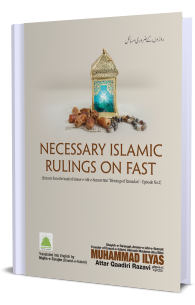
Islam’s Enlightened Teachings
The Multifaceted Message of Fasting
Nasir Jamal Attari Madani
As explained in Hadith, Ramadan is the foremost of all months.[1] Four divine books (the Quran, Zabūr, Injīl, and Tawrāh) were revealed during it.[2]
What can be said of the immense blessings, mercies, and grace bestowed by Allah Almighty during Ramadan? Alongside this, Ramadan encompasses a treasure trove of divine messages.
As mentioned in verse 183 of Surah al-Baqarah, fasting was made obligatory upon this ummah, as it was upon those preceding it. Like other forms of worship, fasting has many dimensions to it relating to knowledge, practice and thought. If one were to reflect upon said dimensions, they come together to form a message, and after an individual understands it, he strives to try and fast with greater passion.
We have been blessed with many messages through the practice of fasting. Let us delve into the treasure trove of messages present in Ramadan. This will allow us to fast in this blessed month with even more burgeoning sincerity, and encourage us to keep voluntary fasts along the obligatory, to the extent that any false obstacles suggested by the Devil will not divert us from this.
1. Time management
Fasting has specific rules attached to it. One of these is time management. For example, we have to wake up at a specific time for suḥūr, and ifṭār must also be performed at its specific time. In terms of rules, one must abstain from eating and sexual intercourse with one’s spouse. To take the fast to perfection, one must also carry out all obligatory acts of worship at their appointed times and avoid sin.
Spending an entire month adhering to these prescribed rulings delivers the message that we must spend established timings according to appointed rules. It is apparent from this that time management and adhering to divine law is easier for a practicing Muslim. If we carry this message over into every aspect of life, we will find ourselves completing every task on time. If we ignore the rulings ordained upon us, we find that our lives become difficult. Acting upon them will facilitate all our affairs.
2. Purifying intentions
Fasting teaches us to focus on pleasing
Allah Almighty instead of being ostentatious. The erudite scholar,
Sayyidunā Sharīf al-Ḥaqq al-Amjadī رَحْمَةُ
الـلّٰـهِ عَـلَيْه, writes:
Prayer is the name given to the performance of specific integrals with a specific outward form according to specific conditions, whereby any onlooker is able to discern that the one performing this act is praying. Ḥajj is the same. With a person leaving his home, travelling, and spending time amongst other Muslims at specific places at a specific time, an onlooker can clearly tell he is performing Hajj. Zakat is given to the poor, which necessitates that others also become aware of it.
Yet fasting has no outward action like this by which people can come to know about it. A fasting person could eat in private, and nobody would know. In comparison with other acts of worship, fasting has no scope for ostentation. When a person truly fasts, he does so purely for the sake of Allah Almighty. For this, Allah Almighty declares, “Fasting is for Me, and I shall issue reward for it.”
When Allah Almighty gives, He does so according to His infinite grandeur and majesty. Yet, when His servant does a beloved deed pleasing Him and He grants reward for this, who can imagine how immense said reward will be?[3]
This message of fasting is that we must do everything only to please Allah Almighty. We must act upon the divine commands given to us by Him. If we focus on this, then even a mountain of difficulties will appear like an insignificant speck of dust in our path.
3. Patience
The timetable of fasting teaches us patience in its entirety. If we take a close look at ourselves, we shall find impatience being a central facet behind many problems we face. If we take the message of patience we acquire from fasting, bear it in mind, and learn to be patient at every step, our lives can be eased greatly.
4. Piety
Fasting offers us great opportunities to adopt piety. The accomplished scholar, Sayyidunā Maḥmūd Aḥmad Riḍawī رَحْمَةُ الـلّٰـهِ عَـلَيْه, writes:
In Ramadan al-Mubārak, it is incumbent on every fasting person that he does not just refrain from eating, drinking, and sexual relations with his spouse. Rather, he should also adopt piety in his actions, speech, and all his transactions, as is apparent from لعلکم تتقون.
When fasting, one must not utilise his bodily limbs in anything evil. He must neither engage his tongue in vices such as backbiting, swearing, or speaking ill, nor listen to such. His eyes should not look at anything declared impermissible by Islamic law. In other words, a fasting person must become a manifestation of piety.
If a person fasts all of Ramadan with all these conditions in mind, the development of piety by the end of the month is certain.[4]
5. Controlling desires
Commonly, people sin for the attainment of pleasure. Through fasting, we are trained to abstain from permissible and impermissible pleasures. If we adopt this principle wholeheartedly, we shall find a way out of our sinful ways for good.
If we want to attain the virtues discussed in this article, we must learn the rulings, benefits, and consequences of fasting. May Allah Almighty grant us the blessings of fasting.
اٰمِيۡن بِجَاهِ خَاتَمِ النَّبِیّٖن صَلَّى الـلّٰـهُ عَلَيْهِ وَاٰلِهٖ وَسَلَّم
















Comments